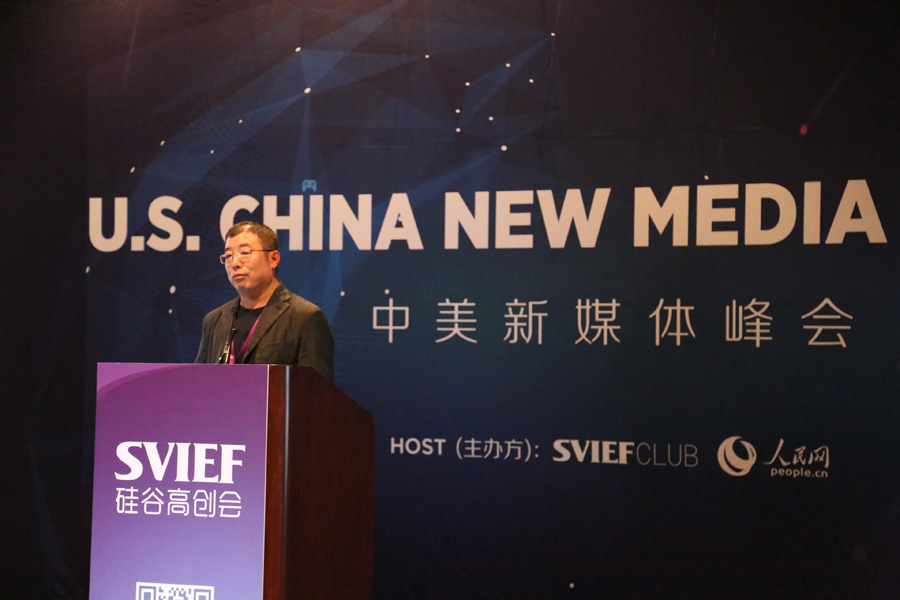


Qi Xiangdong, president of Qihoo 360, speaks at the China-U.S. New Media Summit in Silicon Valley on Oct. 1, 2016. (Photo by Gong Xin)
San Francisco, Oct. 10,——Traditional media seems to be marching every closer to its end, what with the sharp decrease in advertising, drastic page reductions and talent exodus in China. As reforms and changes have been executed by news outlets in search of new paths, Qi Xiangdong, president of Chinese Internet security provider Qihoo 360, has branched out into fresh forms of media.
Last year, Qihoo 360 and Beijing New Media Group jointly formed Btime.com. Qi recently said at the first China-U.S. New Media Summit in Silicon Valley that, “The fundamental reason why I choose media so resolutely is that I see the sign of spring in this sector.” Qi said that mix media, the outcome of integrating traditional media forms and the Internet, will become mainstream in the future.
Although traditional media still has great advantages as a content provider, it is steadily losing users due to two major reasons. First, innovations in Internet technology have led traditional media to fall behind new media giants. Throughout the history of journalism, every technological revolution has caused profound changes in the industry. Today, 3G, 4G and WiFi technologies enable people to more freely and quickly transmit information via portals, search engines and social networks. The rise of social networks in particular makes every person a potential content creator, and the appearance of smart phones has made it possible to read personalized online news anytime, anywhere.
But what has happened to traditional media over the past 20 years? The simple answer is, very little; news production and dissemination techniques haven't undergone any fundamental changes, and the lack of progress has resulted in a massive loss of audiences.
Qi used his own experience to describe the phenomenon. He worked at Xinhua News Agency, the largest news agency in China, for 17 years. In the 1980s, reports were hand written by reporters, revised by senior employees, copied to the news room and input by an operator into the editing system. Some important reports had to be revised seven or eight times, and the reporter would have to copy them as many times. Xinhua's branch offices across the world all followed this procedure, which lasted nearly through the 1990s. It wasn't until the end of that decade that Xinhua bought computers for its reporters.
Therefore, two blocs have formed in modern media. In the past, media in each city and industry had a stable readership thanks to local monopolies and content access, but traditional media has since been forced online – a transition that cost it 90 percent of its audience.
The second problem is homogeneous competition. Every province – every city, even – in China has its own newspaper and TV station. That means more than 2,600 traditional media outlets across the country. They are mostly small, with access to almost all the same resources. They are also undernourished, crowded out by a handful of big commercial platforms.
Facing this dilemma problems, some have argued for eliminating the small outlets, save for four or five, so the surviving outlets can become more competitive. Others have suggested cutting off the big outlets to give the smaller ones more of a chance.
Qi, however, has a third option.
“If we pair traditional media organizations boasting excellent content with Internet companies that have the technology and users, we would have mix media – integrating content, technology and user advantages,” Qi explained.
“I believe that, through in-depth integration of content, technology and users, coupled with innovation in income distribution and news production, mix media is poised to give traditional media a brighter future.”

 Who Will Fit The Chinese Roles In Game Of Thrones?
Who Will Fit The Chinese Roles In Game Of Thrones? China's Hubei Shennongjia added to World Heritage List
China's Hubei Shennongjia added to World Heritage List Cute Dog At Fruit Stand Becomes Latest Internet Sensation
Cute Dog At Fruit Stand Becomes Latest Internet Sensation Top 10 livable Chinese cities
Top 10 livable Chinese cities The last primitive tribe in China
The last primitive tribe in China China's first intelligent security robot debuts in Chongqing
China's first intelligent security robot debuts in Chongqing A Total of 3,552 Subscribers Vanish In Two Days; YouTube Closes All Doors to Users’ Inquiries
A Total of 3,552 Subscribers Vanish In Two Days; YouTube Closes All Doors to Users’ Inquiries Out of this world! Futuristic UFO-shaped yacht has its own garden and a stunning underwater viewing deck
Out of this world! Futuristic UFO-shaped yacht has its own garden and a stunning underwater viewing deck An old tea house in Chengdu
An old tea house in Chengdu Furious Customer Crushes All the Buns from Vendor Just Because He Was Given the Wrong Flavor
Furious Customer Crushes All the Buns from Vendor Just Because He Was Given the Wrong Flavor